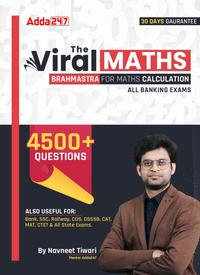Directions (1-5): In each of the following questions, three statements are given, you have to determine that which statement/statements is/are necessary to answer the question.
Q1. A sum of money Rs 2550 is to be distributed among A, B and C. What will be the share of B?
A. A’s share is 1.5 times B’s share,
B. C’s share is half the share of A and B together.
C. The share of A is Rs 340 more than B.
(a) Either A and B together or A and C together are sufficient
(b) Only A and B together are sufficient
(c) Only A and C together are sufficient
(d) All statements are required
(e) Any 2 of the 3 statements are sufficient
Q2. 40 students sit in rows and columns. How many students are seated in each column?
A. The number of rows is 62.50% of the number of columns.
B. The number of rows is 5/8 of the number of columns.
C. The number of rows is less than the number of columns.
(a) Only A
(b) C and either A or B
(c) Only B
(d) Either A or B
(e) All the statements are required
Q3. A boat takes 2 hours to travel from point A to B in still water. To find out the speed upstream, which of the following information is/are required?
A. Distance between point A and B.
B. Time taken to travel downstream from B to A.
C. Speed of the stream of water.
(a) All are required
(b) Any one pair of A and B, B and C or C and A is sufficient.
(c) Only A and B
(d) Only A and C
(e) None of these
Q4. What is the price of a chair?
A. The price of three tables is equal to the price of seven chairs.
B. The difference between the price of a table and that of a chair is Rs 900.
C. The price of one table is 133 1/3% more than the price of one chair.
(a) Only A and B together are sufficient
(b) Only A and C together are sufficient
(c) All together are necessary
(d) B and either A or C together are sufficient
(e) Even all A, B and C together are not sufficient
Q5. A bag contains balls of only three different colors i.e.; red, yellow and green. 3 balls are drawn randomly. What is the probability that the balls drawn are of three different colors?
A. The no. of yellow balls is two more than the no. of red balls.
B. The Sum of the no. of yellow and green balls is three times the no. of red balls.
C. The ratio of the no. of red balls to that of green balls is 3 : 4.
(a) A and either B or C
(b) Any two of them
(c) Only A and C together
(d) Question can’t be answered even after using all the information
(e) All statements are required
Solutions:


. . . . .





 50+ Data Sufficiency Questions For Bank ...
50+ Data Sufficiency Questions For Bank ...
 Quantitative Aptitude Quiz For Bank Main...
Quantitative Aptitude Quiz For Bank Main...
 Quantitative Aptitude Quiz For Bank Foun...
Quantitative Aptitude Quiz For Bank Foun...





